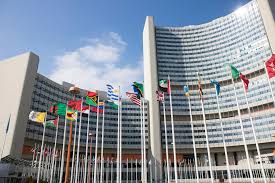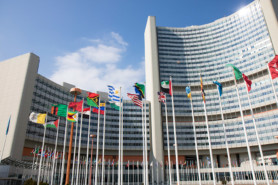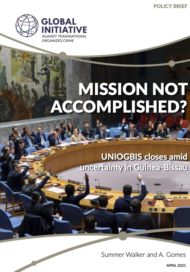Posted on 14 Oct 2018
Will a review mechanism for the UN Convention against Transnational Organized Crime finally be achieved this week at the ninth session of the Conference of the Parties?
There has been much discussion over the past years about a prospective review mechanism for the UN Convention against Transnational Organized Crime (UNTOC). In fact, proposals for the structure of a prospective review mechanism began to emerge almost immediately after the convention was signed in 2000. No agreement could be reached. This time, will it be different as the Conference of the Parties (COP) gets under way in Vienna for its ninth session?
A review mechanism is essentially a system put in place by state parties to a convention to assess how countries are performing in terms of meeting their obligations under the instrument. Reviewing implementation is, as can be imagined, highly political in nature as judgement is effectively passed on country compliance. Without such a mechanism, however, there is no clear measure for determining whether a convention is being successfully or effectively implemented at the country level. By collating information from many countries, a review mechanism also provides a more global framework to assess the international community’s overall response, something badly missing in the debate on organised crime.
At the very first COP in 2004, following the entry into force of UNTOC in September 2003, the first proposals for a review mechanism were presented. Later, in 2010, with a push led by Mexico, country delegates came tantalizingly close to agreeing on an outline, but failed to pull it off. After several years of back and forth, a set of principles around which at least to negotiate a review mechanism were finally agreed on in a 2016 resolution of the COP.
The COP takes place only every two years. It should be a high-level platform to assess progress in implementing the convention – and progress against organized crime in general. Something it has to date not achieved. Whether the ninth session gets closer to agreeing on a review mechanism, where previous COPs have failed, will be clear by week end.
What has hampered reaching a consensus? As the Global Initiative has covered in previous blogs in the UNTOC Watch programme, despite protracted negotiations, the gap between member states on several issues surrounding a review mechanism has simply been too wide. (In contrast, the more established review mechanism for the associated UN Convention against Corruption (UNCAC) continued to move forward, serving both as a model and as a target for criticism in the UNTOC discussions.)
Given the failure to reach real agreement on a review mechanism since 2004, many observers and participants feel that achieving such a mechanism is now all but impossible. For some, although the convention has been ratified by 189 states, its lack of a review mechanism has effectively meant that the convention was ‘dead on arrival’, without the real state support that is needed to make it work. The review mechanism discussion has also become the central point of debate around the convention, effectively pushing aside any real engagement on substance and trends in organized crime. Most now agree that establishing a review mechanism will be the decisive factor in the future success of the convention, and many will be eagerly watching the COP.
COP 2018: This time will it be different?
In a turnaround from the mood of despondency that has prevailed, developments in Vienna over the past few weeks have intimated that there is a greater chance than ever of a review mechanism being achieved. Although it is the finer detail of the negotiations over the coming week at the UNTOC COP that will determine its success or otherwise, the current general mood in diplomatic circles is one of cautious optimism. Similar optimism has not been felt before.
Furthermore, negotiations at the UNODC in Vienna, the convention’s UN System custodian, are strongly shaped by what is known as the ‘Vienna spirit of consensus’, which aims to achieve broad agreement rather than put issues to the vote. Although this increases the chances that objections made by one country, or small groups, can be decisive, it also means that agreement should bring all parties along – which is of great importance in assessing the implementation of what is one of the international community’s most highly ratified global legal instruments.
While formal negotiations will be under way at the ninth session of the COP, informal discussions and intensive consultations have been ongoing among diplomats in the last few weeks. The Italian delegation in particular has been leading efforts to square the circle of competing interests on this issue, continuing their active leadership on the treaty signed, symbolically, in Palermo almost two decades years ago.
The review mechanism, as it is currently envisaged in a draft resolution tabled at the COP, and sponsored by Costa Rica, France and Italy, is currently imagined as a tripartite process. States parties will first be responsible for completing a self-assessment, which will inform a desk-based country review completed by two other states parties. The observations and reports resulting from these country reviews will then be used by the various thematic working groups of the UNTOC COP to make recommendations to the conference.
This process may not have the full scope that some observers will have hoped for, yet neither is it as minimal as some may have feared. In effect, it is a classic UN-style compromise, but one that may be important in the long run to enabling the instrument to remain a viable tool.
A shifting diplomatic landscape
What has driven this sudden momentum, particularly after so many years of impasse? There is a general sense that the Vienna diplomatic community has become weary of wrangling over technicalities. Although a review mechanism for a little-known UN convention may not engage public attention (UNTOC doesn’t pique the general public’s interest to the degree that, for example, the UN Framework Convention on Climate Change does), there is nevertheless frustration at the current lack of progress here. There is a groundswell of feeling that, after grandstanding over the politics around the process for so many years, some substantive results are now needed.
‘Everything has been focused on the technical and process aspects of the mechanism,’ commented one negotiator, who has travelled to Vienna this week, ‘and very little on the substance of organized crime. At least for us, changing that equation means trying to get something in place. It’s now or never.’
And this is a view that seems to be shared by several important players.
Although the main tripping points remain – the depth and scope of the review process, how to fund it and the role of external non-state actors in the form of civil society – a seeming new spirit of engagement by key influential states has driven the process forward. For reasons that are not immediately clear, the US is now broadly supportive of the mechanism, in contrast to an earlier position that was seen as less engaged. Russia, likewise, seems more willing to compromise on some aspects where it had held firm before. Similarly, China is said to be more engaged in this round, and while originally opposed to embracing civil society as having a role to play, is now seen as broadly ready to reach an agreement.
Contrary to its usual approach to these matters, the UK has been uncharacteristically quiet, having moved to block progress previously. It has been reported that Canada, an active participant, which also in the past appeared unwilling to move forward mainly in relation to issues of funding, may be prepared to take a softer approach this time around.
Switzerland and Norway have been vocal supporters of a greater role for civil society, but seem unlikely on this occasion to block a final agreement.
The EU, which many have regarded to be ambivalent, is now also changing its position and looking to achieve stronger support for a review mechanism.
While many states seem to be moving towards a compromise position, there are nevertheless some outliers. Egypt is seen as likely to be opposed to the inclusion of civil society. Others, such as Cuba and Venezuela, which have been active in previous years, and also highly critical of the role of civil society, have been quiet in the run up to the ninth COP.
At the eighth COP South Africa had opposed civil-society participation, but with a new president in Pretoria who has recently praised the role of civil society in tackling ‘state capture’, it will be interesting to see what position it takes. Similarly, Pakistan’s position, usually opposed to civil society’s inclusion, will also be of interest given the outcome of the election in that country.
As mentioned, even though organized crime is an issue of great concern to citizens of many countries around the world, these negotiations garner almost no public attention. However, the ninth session has attracted at least some political interest, with a number of ministers attending (from Italy, Nigeria and South Africa) and at least one president – Panama’s. And, with over 800 participants and 40 side events taking place in the margins of the conference, it looks set to be the busiest COP ever.
There are however notably fewer resolutions than at previous COPs, with focus falling largely on the resolution covering the future review mechanism – a sign, if one was needed, that achieving a review mechanism is seen as the needed step forward for a convention that is otherwise doomed to irrelevance.
Obstacles to agreement
Throughout past discussions on the review mechanism, there have been several major negotiating points, and these may well still prove contentious over the coming week.
The first is agreeing on how the mechanism should be funded. There has been disagreement among states who are supportive of using UN regular budget funds and those that are strongly opposed to this (mainly the US, UK, Japan and Canada) – partly based on a broader policy of containing UN regular budget growth. A compromise agreement seems to be emerging, which would limit the review to existing regular budget funds available to the UNODC/UNTOC COP, with the option for additional extra-budgetary voluntary contributions from states parties.
Furthermore, the US and other states parties are concerned about the burden of time and work the review mechanism will place on them. Clauses in the draft resolution designed to allay these fears suggest that states may be able to submit the same documentation on certain articles of UNTOC – such as those that deal with laundering the proceeds of crime – as for the review mechanism for UNCAC. This allowance is aimed at reducing duplication of work.
And, as indicated, the scope of involvement of civil-society groups has also proved contentious. Here, the resistance comes from concerns that allowing space for non-state parties to voice themselves may lead to robustly critical appraisals of certain states’ records in fighting, or even being involved in, organized crime. It is the kind of criticism that many states are unwilling to be subjected to, especially if it is amplified through the mouthpiece of the UN.
Resistance has also come from several states, including some European countries, that question whether there even exists a cohesive ‘civil society’ centred on organized crime that could be called upon to play any meaningful role. The notion, for some players, that civil society – in the context of transnational organized crime – is little more than a collection of NGOs engaged with victims of migrant trafficking or smuggling is simply a lack of real understanding on the part of diplomats of the wide diversity of non-state entities that respond to organized crime in all its various aspects.
Against these concerns, a compromise solution has more or less been reached allowing for a limited form of civil-society participation. Under the current suggestions, states are encouraged to give civil-society groups a voice at the self-assessment stage, which will clearly depend on the political will of the government in question – yet no role has been allocated in the country review stage.
Limited inclusion through the COP working groups is perhaps not what many civil-society observers would have hoped for, yet contributing to a global assessment of the rapidly evolving nature of organized crime is a prime opportunity to provide a critical perspective.
But, whatever the outcome, civil society, importantly, may be guaranteed some input into the sessions of this COP, either on the margins, in its working groups or at the final stage of the conference. The exact form and scope of this input is yet to be negotiated.
Getting to the starting line
On reflection, a fully comprehensive review mechanism that would have incorporated a critical role for civil-society was never likely to have been on the cards. The sensitivity surrounding organized crime and states’ resistance to international oversight of their law-enforcement and justice systems, which are so often seen as central to national sovereignty, would put paid to that.
However, a formal, non-voluntary review mechanism – even if it has a ‘lighter-touch’ format – is a great improvement on having no mechanism at all, or one that only draws on some states on a voluntary basis, defeating the purpose of a global instrument. But some observers suggest that a weaker mechanism of this kind would be worse than no mechanism. It is hard to sustain this argument, though, given the overall sense that the momentum of the convention has been badly handicapped since its signature. And there is a general feeling among most parties that the secretariat could have played a more decisive leadership role.
Now the opportunity created by the renewed engagement of states parties has given the feeling that establishing a mechanism will be ‘now or never’. It is important to use this opportunity to begin a substantive process around the UNTOC using it as a means to monitor organized crime around the world, as the negotiators of the treaty had always envisaged.
Criticisms have been levelled at the convention, arguing that it is not relevant to those working to combat organized crime on the ground. Civil-society input that reflects the experience of all relevant groups, either affected by organized crime or working to counter it, is essential to ensure the COP is not merely a rarefied diplomatic exercise. Many civil-society groups are highly localized – for example, those engaged in responding to local gangs or extortion or groups combating wildlife trafficking – and it is crucial that these voices are drawn into the international debate, which has largely been conducted in a vacuum and dominated by state actors, isolated from the enormous local impacts of organized crime. Civil society, including community groups, academics, think tanks, journalists and others, could have an important role to play.
As the global threat from organized crime continues to grow and expand into new markets, civil-society activism to combat the issue will only become more established. While its formal role may be restricted, the mere existence of the review mechanism provides a focal point around which civil-society mobilization and monitoring of states’ records on organized crime may be built.
As evidenced by the high level debate on transnational organised crime in the General Assembly in June 2017 and the growing reference of the Security Council to the phenomena, organised crime has become ever more central to the international agenda, yet UNTOC has, for years, been marginalized in these discussions. The potential for an effective review mechanism, even in a limited form, could provide a way of bringing the convention back to the table and fulfil its aim as a framework for international cooperation on organized crime. It may well be a case of ‘now or never’.



